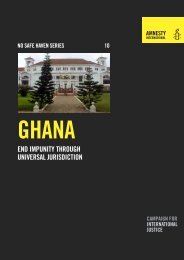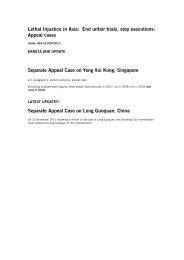read the report - Amnesty International
read the report - Amnesty International
read the report - Amnesty International
You also want an ePaper? Increase the reach of your titles
YUMPU automatically turns print PDFs into web optimized ePapers that Google loves.
NIGERIA<br />
‘WAITING FOR THE HANGMAN’<br />
55<br />
APPENDICES<br />
APPENDIX 1: KEY FINDINGS OF THE NATIONAL STUDY GROUP<br />
ON DEATH PENALTY, 2004<br />
On 22 October 2004, <strong>the</strong> <strong>report</strong> of <strong>the</strong> National Study Group on Death Penalty was<br />
presented to Chief Akin Olujinmi, Attorney General and Minister of Justice of <strong>the</strong> Federal<br />
Republic of Nigeria.<br />
The key findings included:<br />
“It was <strong>the</strong> perception of participating government agencies and <strong>the</strong> public that crime has<br />
increased throughout Nigeria. It is obvious that this perception of high crime rate has caused<br />
widesp<strong>read</strong> feelings of fear and insecurity.”<br />
<br />
“Noteworthy is also <strong>the</strong> feeling that <strong>the</strong> police force was losing <strong>the</strong> fight against crime”<br />
“Many of participants blamed <strong>the</strong> high crime rate on <strong>the</strong> inefficiency of <strong>the</strong> criminal justice<br />
system which does not act as a deterrent to crime.”<br />
“In general <strong>the</strong> study group found that <strong>the</strong> death penalty was widely seen as a solution to<br />
<strong>the</strong> widely perceived failure of <strong>the</strong> criminal justice system.”<br />
“A key finding of <strong>the</strong> study group was <strong>the</strong> high level of cynicism among justice sector<br />
stakeholders on <strong>the</strong> ability and political will on <strong>the</strong> part of <strong>the</strong> Federal government of Nigeria<br />
to undertake <strong>the</strong> necessary far reaching reforms that are required in <strong>the</strong> administration<br />
of justice.”<br />
“They point to <strong>the</strong> several initiatives that have been undertaken in this sector [<strong>the</strong> justice<br />
sector] including <strong>the</strong> <strong>report</strong> of many high level committees which has not been implemented.”<br />
“In summary it is our opinion that <strong>the</strong>re is much disturbing evidence that Nigerians cannot<br />
rely on <strong>the</strong> current criminal justice system to produce results that are ei<strong>the</strong>r fair or accurate.”<br />
“Specifically <strong>the</strong> police are generally seen as corrupt, repressive and ineffective. The<br />
prisons are staffed by poorly paid, inadequately motivated and insufficiently trained officials.<br />
Judicial officers particularly of <strong>the</strong> lower court are generally overworked, underpaid and lack<br />
Index: AFR 44/020/2008 <strong>Amnesty</strong> <strong>International</strong> October 2008

















